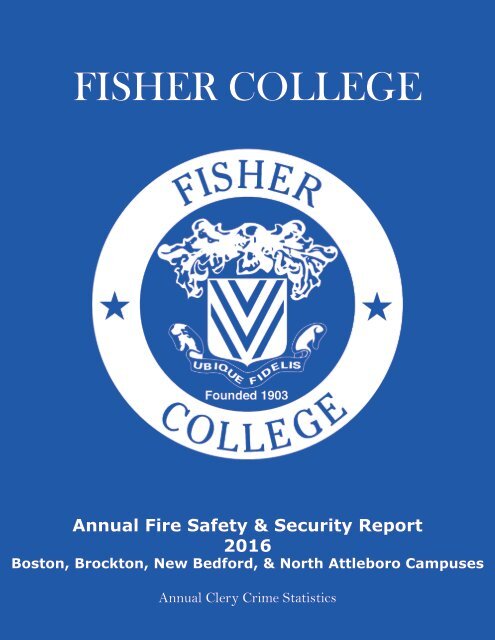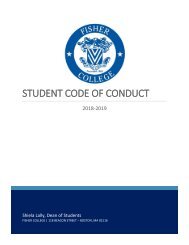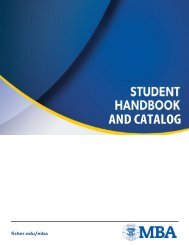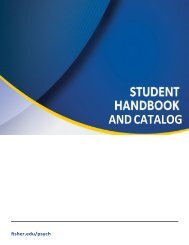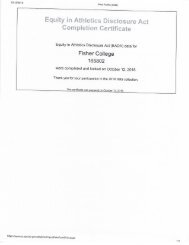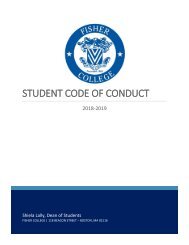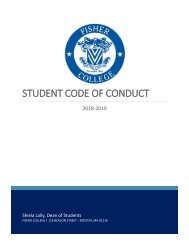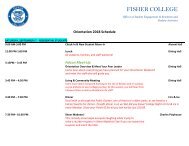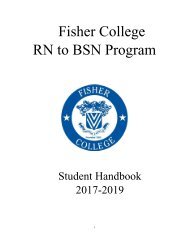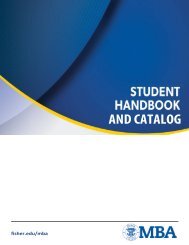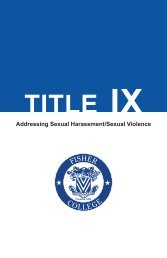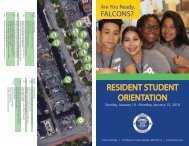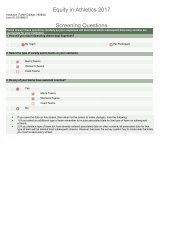Fisher College Clery Report 2016
You also want an ePaper? Increase the reach of your titles
YUMPU automatically turns print PDFs into web optimized ePapers that Google loves.
FISHER COLLEGE<br />
Annual Fire Safety & Security <strong>Report</strong><br />
<strong>2016</strong><br />
Boston, Brockton, New Bedford, & North Attleboro Campuses<br />
Annual <strong>Clery</strong> Crime Statistics<br />
www.fisher.edu/police<br />
1
2 <strong>2016</strong> Annual Security & Fire Safety <strong>Report</strong>
TABLE OF CONTENTS<br />
Message from the Director of Public Safety......................................................................... 2<br />
The Campus Security Act ................................................................................................ 3<br />
<strong>Fisher</strong> <strong>College</strong> Department of Public Safety ....................................................................... 4<br />
Incident <strong>Report</strong>ing.......................................................................................................... 5<br />
Campus Security Authorities ............................................................................................ 5<br />
Response to Calls ........................................................................................................... 5<br />
Daily Crime Log............................................................................................................... 6<br />
Timely Warning Notification............................................................................................... 6<br />
Notification Process......................................................................................................... 6<br />
Timely Warning Methods.................................................................................................. 7<br />
Emergency Operations Plan ............................................................................................. 8<br />
Emergency Notification System ......................................................................................... 8<br />
Notification Methods........................................................................................................ 9<br />
Community Actions....................................................................................................... 10<br />
Evacuation Procedures .................................................................................................. 10<br />
Shelter-in-Place............................................................................................................. 11<br />
Incident Information ..................................................................................................... 12<br />
Voluntary & Confidential <strong>Report</strong>ing.....................................................................................12<br />
Confidentiality Considerations..........................................................................................13<br />
Policy Statement Addressing Security Awareness Programs...................................................13<br />
Policy Statement Addressing Crime Prevention Programs......................................................14<br />
Campus Facilities (Security Access).................................................................................. 14<br />
Missing Student............................................................................................................. 15<br />
Campus Sex Crimes Prevention Act ................................................................................ 15<br />
Sexual Assault.............................................................................................................. 15<br />
Sexual Assault Education & Prevention............................................................................. 16<br />
Hotlines & Helplines ...................................................................................................... 24<br />
Hazing Policy ................................................................................................................ 24<br />
Anti-bullying Policy ....................................................................................................... 24<br />
Smoking/Tobacco Policy ................................................................................................... 24<br />
Alcohol & Drug Policies .................................................................................................. 25<br />
Definitions .................................................................................................................. 25<br />
<strong>Clery</strong> Statistics ............................................................................................................ 27<br />
Fire Safety <strong>Report</strong>...........................................................................................................39<br />
References ...................................................................................................................43<br />
Campus & Site Location Maps...........................................................................................44<br />
www.fisher.edu/police<br />
3
A Message from the Director of Public Safety<br />
Fall <strong>2016</strong><br />
Dear <strong>Fisher</strong> Community:<br />
<strong>Fisher</strong> <strong>College</strong> is committed to the safety of the students, faculty, staff, and visitors who come to our campus.<br />
The <strong>Fisher</strong> <strong>College</strong> Department of Public Safety’s main priority is to ensure not only that you stay safe<br />
while you are on campus, but that you feel safe too. We are also concerned with protecting the property<br />
and assets of the college, enabling <strong>Fisher</strong> to offer rich and productive learning experiences.<br />
The Department of Public Safety (DPS) embraces a community policing philosophy. Expect to see us out<br />
and about, interacting with students and staff at events and meetings. It is our goal to understand the<br />
safety needs of this community and in order to do that, we need to get to know the individuals who make<br />
up the community. We are actively looking for ways to become involved with our community so we can<br />
become a true and valuable resource while you are here at <strong>Fisher</strong> <strong>College</strong>.<br />
The Department of Public Safety operates 24 hours per day, seven days a week, all year-round. The department<br />
patrols the <strong>College</strong> properties, provides emergency response services, and offers various safety<br />
awareness and training programs listed in this publication. As with any community, we depend on members<br />
of the campus to remain vigilant, report any concerns, and make personal safety and the safety of<br />
those around you a priority. With your help, and your prompt reporting of any suspicious activity, we can<br />
make a difference in reducing the opportunity for crime on campus.<br />
We can be reached at extension 8880 from on campus or dial 617-236-8880 from your cell phone or a<br />
landline. Please enjoy your time here at <strong>Fisher</strong> <strong>College</strong>, and stay safe.<br />
Deborah Crafts<br />
Director of Public Safety<br />
2 <strong>2016</strong> Annual Security & Fire Safety <strong>Report</strong>
The Campus Security Act requires colleges and universities to:<br />
• Publish an annual report every year by October 1 that contains three years of campus crime statistics<br />
and certain campus security policy statements;<br />
• Disclose crime statistics for the campus, public areas immediately adjacent to or running through the<br />
campus, and certain non-campus facilities and remote classrooms.<br />
• The statistics must be gathered from campus police or security, local law enforcement, and other <strong>College</strong><br />
officials who have “significant responsibility for student and campus activities;” otherwise known<br />
as a Campus Security Authority (CSA).<br />
• Provide “timely warning” notices of those crimes that have occurred and “pose an ongoing threat to<br />
students and employees;”<br />
• Disclose in a public crime log “any crime that occurred on campus...or within the patrol jurisdiction of<br />
the campus police or the campus security department and is reported to the campus police or security<br />
department;” and<br />
• Disclose any agreements with state and/or local law enforcement.<br />
• The information contained in this brochure pertains to the Boston, New Bedford, Brockton, and North<br />
Attleboro campuses unless where otherwise noted.<br />
www.fisher.edu/police<br />
3
<strong>Fisher</strong> <strong>College</strong> Department of Public Safety<br />
The <strong>Fisher</strong> <strong>College</strong> Department of Public Safety provides law enforcement and security services to the<br />
<strong>Fisher</strong> <strong>College</strong> community.<br />
The department is comprised of state certified and sheriff certified police officers as well as public safety<br />
officers. The department also supplements staffing with contract security.<br />
<strong>Fisher</strong> <strong>College</strong> police officers are empowered under the State of Massachusetts General Laws, MGL Chapter<br />
22 Section 63. Police officers have full police authority on <strong>Fisher</strong> <strong>College</strong> property granted to any law<br />
enforcement officer, including the authority to make arrests. Police jurisdiction includes property owned by,<br />
or under the control of, <strong>Fisher</strong> <strong>College</strong>.<br />
The department also works closely with the local police in all of our campus communities when there is a<br />
crime on campus.<br />
In addition, the department has radio communications with the Boston Police to provide real time communication.<br />
The Boston Police respond to the campus when needed and the <strong>College</strong> has an understanding relative to<br />
critical incident response.<br />
<strong>Fisher</strong> <strong>College</strong> police officers have been trained by members of the Boston Police Academy staff relative to<br />
the protocol, tactics and procedures for critical incidents.<br />
The <strong>Fisher</strong> <strong>College</strong> Department of Public Safety does not currently have a Memorandum of Understanding<br />
with Boston, New Bedford, Brockton, or North Attleboro Police pertaining to the investigation of criminal<br />
incidents. <strong>Fisher</strong> <strong>College</strong> does not have any recognized student organizations that have off-campus student<br />
housing facilities.<br />
4 <strong>2016</strong> Annual Security & Fire Safety <strong>Report</strong>
Incident <strong>Report</strong>ing<br />
If an emergency occurs, contact 911 immediately, then contact Public Safety at 617-236-8880.<br />
Students, staff, faculty, and visitors are encouraged to accurately and immediately report any suspicious<br />
or criminal activity to Public Safety at 617-236-8880 or extension 8880 from a campus phone.<br />
Students, staff and visitors at the Brockton, New Bedford, and North Attleboro should call 911 for assistance.<br />
Campus Security Authorities<br />
Federal Law requires the <strong>College</strong> to disclose statistics concerning the occurrence of certain crimes reported<br />
to campus security authorities (CSAs). CSAs include any member of the Department of Public Safety, including<br />
contract security officers, <strong>College</strong> officials who have significant responsibility for student and campus<br />
activities, and others identified in the report as individuals or organizations to whom or which students<br />
and employees should report criminal offenses.<br />
<strong>Fisher</strong> <strong>College</strong>’s CSAs include the following:<br />
• Director of Housing and Residential Life<br />
• Student Conduct Coordinator<br />
• Athletic Coaches<br />
• Dean of Students<br />
• Director of Athletics and all coaches, both head coaches and assistant coaches<br />
• International Admissions<br />
• Department of Public Safety<br />
• Contract Security Officers<br />
• Resident Directors and Resident Assistants<br />
• Vice President of Academic Affairs<br />
• Advisors of Student Clubs and Organizations<br />
• Director of Student Involvement<br />
• Assistant Director of Student Involvement<br />
• Student Desk Assistants<br />
• DAPS Site Coordinator of the Boston Campus<br />
• DAPS Site Coordinator of Brockton Campus<br />
• DAPS Site Coordinator of North Attleboro Campus<br />
• DAPS Site Coordinator of New Bedford Campus<br />
All CSAs should encourage any person who reports a crime or other incident involving campus security to<br />
notify the Department of Public Safety immediately. Any CSA who receives a report of an incident involving<br />
a crime or campus security matter must contact the Department of Public Safety immediately and<br />
inform the Department of the incident consistent with the confidentiality considerations discussed below.<br />
Response to Calls<br />
The Department of Public Safety’s procedures include an immediate response to all calls for assistance<br />
including emergency calls. The department works closely with the full range of City of local emergency<br />
responders to assure a complete and timely response to all emergency calls. Priority response is given to<br />
crimes against persons and personal injuries.<br />
In response to a non-emergency call Public Safety at 617-236-8880, the officer on duty will take the required<br />
action, either dispatching an officer or asking the victim to report to the public safety desk to file an<br />
incident report.<br />
www.fisher.edu/police<br />
5
Whatever the event or incident, officers will respond and will use the resources of local, state, and federal<br />
law enforcement agencies to provide support and assistance.<br />
Daily Crime Log<br />
The Department of Public Safety maintains a Daily Crime Log which provides the community with information<br />
about crime on campus. The Daily Crime Log is available for review during normal business hours at<br />
the campus police desk at 118 Beacon Street.<br />
Timely Warning Notification<br />
In the event that a situation arises on campus that, in the judgment of the Dean of Students or Director<br />
of Public Safety constitutes a serious or continuing threat to members of the <strong>College</strong> community, a timely<br />
warning will be sent. A campus wide “timely warning” will be issued in compliance with the federal Jeanne<br />
<strong>Clery</strong> Disclosure of Campus Security Policy and Campus Crime Statistics Act of 1998.<br />
<strong>Fisher</strong> <strong>College</strong> issues timely warning notices whenever a <strong>Clery</strong> crime is considered to pose a serious or<br />
continuing threat to students, faculty and staff. Significant criminal incidents that might elicit a timely<br />
warning include, but are not limited to, crimes of violence or patterns of property crimes. Timely warnings<br />
may be issued for the following crime classifications: aggravated assault, major incidents of arson,<br />
burglary, criminal homicide, motor vehicle theft, robbery, and sex offense, when the crime is deemed to<br />
pose an ongoing threat to the <strong>Fisher</strong> community. The Director of Public Safety and the Dean of Students<br />
reviews all reports to determine if there is an on-going threat to the community and if the distribution of a<br />
timely warning is warranted.<br />
Notification Process<br />
The Dean of Students consults with the Director of Public Safety regarding crimes affecting the community<br />
to determine the need for a timely warning. The Dean of Students is the approval authority for posting<br />
timely warnings. Timely warnings of serious crimes are conveyed to the community through the Emergency<br />
Notification System. Certain other Crime Alerts may also be prepared by the Director of Public Safety<br />
and distributed to all students, staff and faculty via email and posters.<br />
These Crime Alerts contain a brief description of the incident; the date, time, and location of the incident;<br />
and precautions to take. The amount and type of information presented in the warning will vary depending<br />
on the circumstances of the crime. A warning that could jeopardize a criminal investigation will not include<br />
information that would jeopardize the investigation.<br />
The Director and the Dean will determine if a timely warning is necessary and the alerts are generally<br />
written and distributed to the community by the Director of Public Safety or Dean of Students depending<br />
on method of distribution. In the case of an emergency or other urgent event, students, faculty, and staff<br />
may be contacted through a variety of methods. These may include; Blackboard Connect, telephone, text<br />
message, email, courier (direct notification through staff), local media, campus websites, community postings,<br />
flat screen panels, and loud speaker to communicate timely warnings, see chart below.<br />
<strong>Fisher</strong> <strong>College</strong> Timely Warning Methods<br />
6 <strong>2016</strong> Annual Security & Fire Safety <strong>Report</strong>
Marketing<br />
Director<br />
Marketing<br />
Director<br />
Marketing<br />
Director<br />
www.fisher.edu/police<br />
7
Emergency Operations Plan<br />
The <strong>Fisher</strong> <strong>College</strong> Emergency Operations Plan is the <strong>College</strong>’s emergency response plan. The EOP documents<br />
the framework, processes and communications required for a successful response to, and recovery<br />
from, an emergency incident. The plan includes descriptions of categories for classifications of emergency<br />
incidents, as well as specific responsibilities and actions by level. The EOP also discusses the role of Emergency<br />
Response Team (ERT) and other staff in each department.<br />
<strong>Fisher</strong> <strong>College</strong> police officers have received training in Incident Command and Responding to Critical Incidents<br />
on Campus. If a serious incident occurs that causes an immediate threat to the campus, the first<br />
responders to the scene are usually <strong>Fisher</strong> police officers and emergency responders and they typically<br />
respond and work together to manage the incident. Depending on the nature of the incident, other <strong>Fisher</strong><br />
<strong>College</strong> departments and other local or federal agencies could also be involved in responding to the incident.<br />
General information about the emergency response and evacuation procedures for <strong>Fisher</strong> <strong>College</strong> are<br />
publicized each year as part of the institution’s <strong>Clery</strong> Act compliance efforts and that information is available<br />
at the Public Safety Office.<br />
<strong>Fisher</strong> <strong>College</strong> Emergency Notification System<br />
The <strong>College</strong> has implemented an Emergency Notification System in conjunction with Blackboard Connect<br />
to enhance the <strong>College</strong>’s ability to reach all students, faculty, and staff with time-sensitive information<br />
during unforeseen events or emergencies. The system uses voice, e-mail, and text messaging to allow the<br />
<strong>College</strong> to provide pertinent information and details on appropriate responses during critical situations. We<br />
encourage members of the campus community to take advantage of the opportunity to provide multiple<br />
contact options. Voice notification messages will appear to be from “617-236-8800”. SMS text will appear<br />
to be from SMS@blackboard.com. Email messages will be sent from FISHER COLLEGE email@blackboardconnect.com.<br />
This is where we need your help and cooperation! Staff, please make sure that you are registered at:<br />
www.fisher.edu/about/staff-directory/notifications. Should you need to update your contact information,<br />
please contact the Office of the Registrar at 617-236-8825 or registrar@fisher.edu to make sure your current<br />
information is on file.<br />
The Dean of Students and Director of Public Safety consult with other <strong>Fisher</strong> <strong>College</strong> administrators, local<br />
first responders and/or the National Weather Service to confirm that there is a significant emergency or<br />
dangerous situation that poses an immediate threat to the health or safety of some or all members of the<br />
<strong>Fisher</strong> <strong>College</strong> community. The Dean of Students and Director of Public Safety will collaborate to determine<br />
the content of the message and appropriate segments of the campus community that should receive the<br />
notification. The Dean of Students and the Director of Public Safety will use some or all of the systems<br />
described below to communicate the threat to the <strong>Fisher</strong> <strong>College</strong> community or to the appropriate segment<br />
of the community, if the threat is limited to a particular building or segment of the population. <strong>Fisher</strong><br />
<strong>College</strong> will, without delay and taking into account the safety of the community, and the impact on the<br />
efforts to respond to the emergency, determine the content of the notification and initiate the notification<br />
system, unless issuing a notification will, in the professional judgment of the first responders compromise<br />
the efforts to assist a victim or to contain, respond to, or otherwise respond to the emergency.<br />
8 <strong>2016</strong> Annual Security & Fire Safety <strong>Report</strong>
Marketing<br />
Director<br />
Marketing<br />
Director<br />
Marketing<br />
Director<br />
www.fisher.edu/police<br />
9
Community Actions<br />
Community members, upon receiving a notice of an alert, should seek additional information and take<br />
actions to protect themselves and to alert others.<br />
Generally, it is difficult to provide a set of instructions applicable to all community members. Individual<br />
necessary actions will depend on factors such as the type and one’s proximity to the emergency.<br />
<strong>Fisher</strong> <strong>College</strong> will immediately notify the campus community upon confirmation of a significant emergency<br />
or dangerous situation involving an immediate threat to the health or safety of students or staff occurring<br />
on the campus. If there is an immediate threat to the health or safety of members of the <strong>Fisher</strong> <strong>College</strong><br />
community, follow up information will be provided to the community using some or all of the methods of<br />
communication listed above.<br />
Members of the larger <strong>Fisher</strong> community can receive information about emergencies on campus through<br />
the local media and the <strong>Fisher</strong> <strong>College</strong> website, www.fisher.edu.<br />
Evacuation Procedures<br />
<strong>Fisher</strong> <strong>College</strong> regularly conducts fire drills requiring evacuation in its facilities. Theses drills are announced.<br />
These drills are used to:<br />
• Familiarize community members to the audible and visible evacuation signals and the exit routes available<br />
to use in the event of a fire or other situation that requires immediate evacuation<br />
• Evaluate the performance of the employees in a fire incident and the effectiveness of the behaviors<br />
used in accordance with the fire drills and the Emergency Plans.<br />
The results of the drills are documented. Evacuation plans are posted in each dormitory building that show<br />
the floor plan, exits and suggested evacuation routes. Evacuation procedures are as follows:<br />
1. SOUND THE ALARM<br />
• If you discover or suspect a fire, sound the building fire alarm.<br />
• Warn other occupants by knocking on doors and shouting “fire” as you leave the building or other<br />
prepared methods as outlined in the Emergency Operations Plan.<br />
2. EXITING A ROOM<br />
• Before opening any door, feel the doorknob with the back of your hand. Do not open the door if it<br />
is hot.<br />
• Brace yourself behind the door, crouch low, and open the door slightly if it is warm.<br />
• Stay low if the area is smoky. If heat or heavy smoke is present, close the door and stay in your<br />
room.<br />
3. LEAVE THE BUILDING<br />
• Try to rescue others ONLY if you can do so safely.<br />
• Move away from the building and out of the way of the fire department.<br />
• Don’t go back into the building until the fire department says it is safe to do so.<br />
4. CALL THE FIRE/POLICE DEPARTMENT<br />
• Dial 911.<br />
• Give as much information as possible to the 911 operator.<br />
Immediately evacuate. Hazardous equipment or processes should be shut down before leaving unless doing<br />
so presents a greater hazard. Remember to close all doors as you leave.<br />
Assist anyone who may be in danger, if you can do so without endangering yourself. Exit the building in a<br />
calm manner using the stairs - never use elevators. After you have left the building, go to your pre-designated<br />
assembly point and remain there. Remain outside the building, even if the alarm is silenced, until<br />
the fire department has given the “all clear”. Maintain a safe distance from the building, to allow ample<br />
10 <strong>2016</strong> Annual Security & Fire Safety <strong>Report</strong>
oom for emergency personnel and equipment to access the building. <strong>Report</strong> to your designated assembly<br />
area.<br />
If routes are blocked:<br />
• Go back to your room, close the door and call 911 to report your location.<br />
• Seal the cracks around the door to prevent smoke from entering.<br />
• Open the window a few inches for fresh air and hang a brightly colored cloth or bed sheet out the window<br />
to alert the Fire Department to your location. If you have a flashlight, use it to signal at night.<br />
• If smoke gets in your room, keep low and dampen a cloth with water, place it over your nose and<br />
breathe lightly through it.<br />
• Stay calm. Do not jump from windows above the second floor. Rescue personnel have the proper<br />
equipment to get to you quickly.<br />
Shelter-in-Place<br />
Sheltering-in-place provides protection from external hazards and minimizes the chance of injury and/or<br />
provides the time necessary to allow for a safe evacuation. This should be done by selecting a small, interior<br />
room if possible, with no or as few windows as possible. When authorities issue directives to shelterin-place,<br />
do not walk outdoors, take refuge indoors immediately.<br />
A shelter-in-place order may be issued for several reasons:<br />
• Active Shooter<br />
• Severe weather<br />
• Hazardous materials<br />
• Civil Unrest<br />
• Hostage situation<br />
Or any situation where it is best for you to stay where you are to avoid any outside threat. When a shelter-in-place<br />
is ordered:<br />
• Remain CALM.<br />
• Faculty should recommend to students and others not to leave or go outside.<br />
• Depending on the type of incident, such as an active shooter, barricade doors with heavy furniture.<br />
• If you are in a residence hall, remain there.<br />
• Select a small interior room, above the ground floor, with no or few windows and air vents if possible.<br />
• Close and lock all windows, exterior doors, and any other openings that lead to the outside.<br />
• Stay away from all windows and doors.<br />
• Facilities should shut down all building ventilation fans and air conditioners, when and if appropriate.<br />
• If you are told there is danger of explosion, close the window shades, blinds, or curtains.<br />
• Room(s) should have adequate space for everyone to be able to sit down comfortably.<br />
• Avoid overcrowding by selecting several rooms when necessary and possible.<br />
In extreme weather situations, relocate to a lower level interior section of the building. For external chemical,<br />
biological or radiological incidents:<br />
• Stay inside and move to an inner corridor or office.<br />
• Facilities may shut down all building ventilation fans and air conditioners, when necessary and appropriate.<br />
• Since many chemical agents are heavier than air, and tend to hold close to the ground move to higher<br />
levels of the building if possible to reduce the transfer of contaminated air from outside to inside.<br />
• Remain alert for instructions and updates as they become available from the emergency personnel and<br />
college administrators.<br />
www.fisher.edu/police<br />
11
Incident Information<br />
Incidents may occur on campus that do not appear to involve an immediate threat to the health and safety<br />
of students or employees, but due to their significance, may justify community notification. Incidents<br />
may include, but are not limited to: follow up to an emergency notification; a significant incident on or off<br />
campus; severe weather warning; or a major infrastructure failure.<br />
Voluntary & Confidential <strong>Report</strong>ing<br />
Occasionally, victims of crime wish to report a crime but do not want to give their name and/or do not<br />
want to pursue action through the criminal justice or <strong>College</strong> conduct systems. Anyone who is the victim<br />
or witness to a crime on campus is encouraged to promptly report the incident to the police. <strong>Fisher</strong> Department<br />
of Public Safety does not promise confidentiality to crimes that are reported. Confidential reports<br />
for purposes of inclusion in the annual disclosure of crime statistics can generally be made to other<br />
<strong>Fisher</strong> Campus Security Authorities as identified in this report. Confidential reports of crime may be made<br />
to the anonymous tip line:<br />
Text: tip411 (847411)<br />
Keyword: <strong>Fisher</strong><br />
Confidentiality Considerations<br />
A Campus Security Authority (CSA) is not required to disclose to the Department confidential information<br />
concerning an incident, such as information that would identify a victim of a crime who wishes for his or<br />
her identity to remain confidential. However, CSAs are required to inform the department of the existence<br />
of all known incidents, including confidential incidents, so that incidents can be recorded as statistics by<br />
the Department of Public Safety and, where appropriate, included it the <strong>College</strong>’s annual security report.<br />
If a reporting party does not consent to the disclosure to the Department, CSAs are expected to inform the<br />
Department of the complainant’s wish for confidentiality and to report the incident to the Department for statistical<br />
purposes only. CSAs must report an incident to the Department without disclosing identifying information<br />
concerning the reporting party unless the reporting party consents to disclosure of his or her identity.<br />
The <strong>College</strong> urges all community members to report any criminal incident to the Public Safety Department.<br />
In the event an individual chooses not to report a crime, the <strong>College</strong> urges the person to at least disclose<br />
the occurrence of the incident to a CSA so it may be counted, as appropriate, in the <strong>College</strong>’s Annual Security<br />
<strong>Report</strong> (ASR).<br />
As allowed by the <strong>Clery</strong> Act, pastoral and professional counselors who receive confidential reports are not<br />
required to report these crimes to the Department of Public Safety for inclusion into the annual disclosure<br />
of crime statistics or for the purpose of a timely warning. Pastoral and professional counselors do make<br />
individuals they are counseling aware of the voluntary confidential reporting options available to them that<br />
would allow for a report to be included in the annual disclosure of crime statistics.<br />
It should be noted that if a pastoral or professional counselor serves another function at <strong>Fisher</strong> <strong>College</strong>,<br />
such as an advisor to a student organization, then they are required to report crimes to the Department of<br />
Public Safety for inclusion in the annual disclosure of crime statistics.<br />
The following are positions which are confidential and as such the <strong>Clery</strong> Act does not mandate reporting:<br />
Pastoral Counselor: a person who is associated with a religious order or denomination, is recognized by<br />
that religious order or denomination as someone who provides confidential counseling, and is functioning<br />
within the scope of that recognition as a pastoral counselor.<br />
Professional Counselor: a person whose official responsibilities include providing mental health<br />
counseling to members of the <strong>Fisher</strong> community and who is functioning within the scope of his or her license<br />
or certification.<br />
12 <strong>2016</strong> Annual Security & Fire Safety <strong>Report</strong>
Pastoral counselors and professional counselors, if and when they deem it appropriate, are encouraged to<br />
inform the persons they are counseling of the procedures to a report crime to public safety for inclusion in<br />
the annual disclosure of crime statistics.<br />
Policy Statement Addressing Security Awareness Programs for Students and Employees<br />
During orientation, summer registration days, and at the beginning of the Fall Semester students and their<br />
parents are informed of services offered by the <strong>Fisher</strong> <strong>College</strong> Department of Public Safety. Students are<br />
told about safety and theft prevention, similar information is shared with staff during their onboarding<br />
process. Crime Prevention Programs, Sexual Assault Prevention Programs, Domestic Violence, and stalking<br />
programs are offered by the Housing office throughout the year.<br />
Policy Statement Addressing Crime Prevention Programs for Students and Employees<br />
Crime prevention programs on personal safety and theft prevention are sponsored by various campus departments<br />
throughout the year. Campus police personnel facilitate programs for student, parents and staff<br />
during orientations and summer registration days. Some of the crime prevention programs offered are<br />
safety awareness, safety in the city, alcohol awareness, and sexual assault prevention.<br />
Personnel Safety Workshops<br />
In an effort to educate the <strong>Fisher</strong> community about the safety and security realities accompanying life in<br />
a large city, the Department of Public Safety provides opportunities for all members of the community to<br />
learn about precautions for avoiding victimization. Officers conduct crime awareness workshops for <strong>Fisher</strong><br />
community members during student and employee orientations, which are designed to enhance awareness<br />
and improve personal safety.<br />
Crime Bulletins and Alerts<br />
The Department of Public Safety periodically distributes crime bulletins or alerts to inform members of the<br />
<strong>Fisher</strong> Community about incidents of crime in the areas surrounding the <strong>College</strong>. These bulletins and alerts<br />
are also circulated at times, not in response to a specific incident, but as general reminders to community<br />
members about measures to be taken to enhance personal and property security.<br />
Sexual Assault Awareness and Prevention<br />
The potential for occurrences of sexual assault is a reality for all colleges and universities, regardless of<br />
their location. As discussed more fully below in the <strong>College</strong>’s statement of policy on sexual assault,<br />
<strong>Fisher</strong> will not tolerate sexually hostile conduct of any type, whether in the nature of sexual assault or<br />
sexual harassment.<br />
The <strong>College</strong> actively endeavors to educate students and staff concerning sexual assault awareness<br />
through, among other things, presentations and trainings by the Department of Public Safety and the<br />
Counseling Center at new student and employee orientations, distribution of educational literature, and<br />
informal dissemination of information to on-campus residents through the Office of Housing and Residence<br />
Life. The <strong>College</strong> brings in outside organizations such as True To Life and the Boston Area Rape Crisis Center<br />
which also provides interactive educational programming for students.<br />
The <strong>College</strong> recognizes the value of relationships between Resident Assistants and on-campus residents in<br />
the effort to communicate messages about personal safety. Therefore, Resident Assistants are an important<br />
component of the <strong>College</strong>’s efforts to raise awareness about sexual assault. In coordination with Counseling<br />
Services, the Office of Housing and Residence Life provides annual sexual assault response and education<br />
training to all new and returning Resident Assistants prior to the arrival of students on campus each<br />
Fall and Spring. These trainings are designed to facilitate communication between Resident Assistants and<br />
residents, and to foster students’ trust in bringing allegations of sexual assault to the <strong>College</strong>’s attention.<br />
www.fisher.edu/police<br />
13
Rape Aggression Defense (RAD)<br />
RAD is a popular self-defense program that is offered through the Department of Public Safety. The RAD<br />
course is available free of charge to all female students, faculty, and staff. RAD is easy to learn, easy to<br />
retain, and easy to employ during confrontational situations.<br />
The course consists of approximately 12 hours of awareness, prevention, risk reduction strategies, and<br />
physical self-defense, all of which culminate in a final session where students participate in a realistic simulation<br />
exercise and are able to practice what they learned.<br />
Campus Facilities (Security Access)<br />
Campus Alarms<br />
Campus facilities are alarmed to detect smoke, heat, and intrusion. All intrusion, fire, smoke, and carbon<br />
monoxide alarms register at the Department of Public Safety Operations Center, or with a central operator.<br />
Public Safety officers respond to all alarms on campus in addition to any response provided by the various<br />
City emergency responders.<br />
Access to Academic and Administrative Buildings<br />
All academic and administrative facilities are equipped with electronic card readers attached to an on- line<br />
server. A current <strong>Fisher</strong> <strong>College</strong> ID is required for entry into <strong>College</strong> facilities after 4pm.<br />
Access to Residential Areas<br />
The <strong>College</strong> takes seriously the safety of all of its community members, particularly those in residence<br />
on campus. Residential areas may be entered only in accordance with policies and procedures promulgated<br />
by the Office of Housing and Residence Life and published in the Student Code of Conduct.<br />
Access to the residence halls is monitored by Campus Police, contract security and desk receptionists are<br />
on duty at building 116 and 133 entrances. A valid <strong>Fisher</strong> <strong>College</strong> photo identification card indicating current<br />
residence hall access privileges is required for admission into all residence halls.<br />
The faculty and staff of the <strong>College</strong> are required to comply with all established policies and procedures<br />
concerning entry into the residence areas. Any employee found to have violated these policies or procedures<br />
may be subject to disciplinary action, up to and including termination.<br />
Access to Buildings for Maintenance and Repair<br />
Regular maintenance, alterations, and repairs of <strong>Fisher</strong> <strong>College</strong> facilities are performed by the <strong>College</strong>’s<br />
Facilities Department. On occasion, such work is also performed by outside contractors retained by the<br />
<strong>College</strong>. The <strong>College</strong>’s Facilities Department is responsible for the structural, mechanical, and electrical<br />
maintenance of all <strong>College</strong> buildings. Typical services provided by Facilities Management, which interacts<br />
with the Department of Public Safety to provide safety and security to the <strong>College</strong> community, include:<br />
• Electricity and lighting<br />
• Elevators<br />
• Custodial services<br />
• Doors and locks<br />
• Heat; and<br />
• Window and door glass<br />
Most maintenance is performed periodically and does not have to be requested. However, whenever unpredictable<br />
failures occur or additional maintenance work is required beyond normally scheduled maintenance,<br />
community members may report problems to the Campus Police Desk (extension 8880 from any<br />
campus phone and 617-236-8880 from any non-campus or cell phone). This is a 24 hours a day, year<br />
14 <strong>2016</strong> Annual Security & Fire Safety <strong>Report</strong>
ound system that ensures requests are logged and scheduled in a timely manner. If the request is urgent,<br />
it will be dispatched immediately. Safety and security-related maintenance requests are given the highest<br />
scheduling priority.<br />
Missing Student<br />
• On a biannual basis, <strong>Fisher</strong> <strong>College</strong> informs each student living on campus housing during the check<br />
in and clearance process that he or she has the option to identify an individual to be contacted by the<br />
institution no later than 24 hours after the time that the student in question is determined missing in<br />
accordance with official notification procedures established by the institution.<br />
▪▪<br />
▪▪<br />
Residential students may register a confidential contact person or persons who will be notified by<br />
<strong>Fisher</strong> <strong>College</strong> if they are determined missing. Students may register their confidential contact<br />
by filling out the form during the check in process both fall and spring semester or by visiting the<br />
Dean of Student’s Office.<br />
<strong>Fisher</strong> <strong>College</strong> will maintain registered contacts confidentially and this information will only be accessible<br />
to authorized campus officials and law enforcement and it will not be disclosed outside of<br />
a missing person investigation.<br />
• For each student who is under 18 years of age, and not an emancipated individual, <strong>Fisher</strong> <strong>College</strong> will<br />
notify their custodial parent or guardian no later than 24 hours after the time that the student is determined<br />
to be missing.<br />
• <strong>Fisher</strong> <strong>College</strong> will notify Boston Police no later than 24 hours after the time that the student is determined<br />
missing, regardless of whether the student has identified a contact person, is above the age of<br />
18, or is an emancipated minor.<br />
• If the Department of Public Safety has been notified and makes a determination that a student who is<br />
the subject of a missing person report has been missing for more than 24 hours and has not returned<br />
to the campus, <strong>Fisher</strong> <strong>College</strong> will notify the registered confidential contact person.<br />
• The confidential contact is kept in the Housing Office.<br />
<strong>Fisher</strong> <strong>College</strong> community members should report that a student has been missing for 24 hours to the<br />
Department of Public Safety.<br />
Campus Sex Crimes Prevention Act<br />
The Federal Campus Sex Crimes Prevention Act requires colleges and universities to issue a statement advising<br />
the campus community where state law enforcement agency information concerning registered sex<br />
offenders may be obtained. The Act also requires registered sex offenders to provide to appropriate state<br />
officials notice of each institution of higher education at which the offender is employed, carries on a vocation,<br />
or is a student. The <strong>Fisher</strong> <strong>College</strong> community may access information regarding sexual offenders<br />
by contacting the Boston Police Department or by contacting the Massachusetts Executive Office of Public<br />
Safety. The sexual offender webpage can be accessed at www.mass.gov/eopss/agencies/sorb.<br />
Sexual Assault<br />
Sexual assault is a crime punishable by both civil and criminal legal action. The student conduct process<br />
is administered through the Dean of Students Office at the request of the victim, all incidents involving<br />
sex offenses in which the alleged perpetrator is a <strong>Fisher</strong> <strong>College</strong> student. <strong>Fisher</strong> <strong>College</strong> also encourages<br />
victims to prosecute alleged perpetrators to the fullest extent of the law. There are several avenues for<br />
assistance if a person becomes the victim of a sex offense which are described below.<br />
Victims of sexual assault tend to feel a variety of conflicting emotions: rage, fear, depression, relief to<br />
have survived, numbness and exhaustion, to name just a few. Two vital points to remember are that the<br />
assault was not your fault and there is help available.<br />
<strong>Fisher</strong> <strong>College</strong>’s Department of Public Safety trains every police officer on protecting the rights of victims<br />
and witnesses of crimes. Referral information is accessible at all times regarding area services available for<br />
www.fisher.edu/police<br />
15
general counseling, medical attention, emergency housing or financial assistance. Responsiveness to the<br />
needs of crime victims is a priority for the Department of Public Safety.<br />
Sexual Assault Education and Prevention<br />
<strong>Fisher</strong> <strong>College</strong> students receive information about the prevention of sexual assaults, date rape and acquaintance<br />
rape through various programs including information about prevention at Student Orientation.<br />
Information is also available through the Department of Public Safety and <strong>Fisher</strong> <strong>College</strong> Health Services.<br />
The <strong>College</strong> also brings in outside organizations such as Sex Signals and the Boston Area Rape Crisis Center<br />
which provide interactive educational programs.<br />
IF A SEXUAL ASSAULT HAPPENS TO YOU:<br />
• Go to a safe location.<br />
▪▪<br />
Contact the local police for immediate assistance and information.<br />
◦◦<br />
On the Boston Campus the <strong>Fisher</strong> Police Department can be contacted for assistance at 617-<br />
236-8880, or Boston Police can be called directly at 911.<br />
◦◦<br />
On the New Bedford Campus, call 911<br />
◦◦<br />
On the North Attleboro campus, call 911<br />
◦◦<br />
On the Brockton Campus, call 911<br />
• Go the closest hospital Emergency Room. A qualified physician or nurse will examine you for injuries<br />
and collect physical evidence that could be used in criminal proceedings if you decide to prosecute.<br />
Hospital nurses have been trained and are certified to aid victims of sexual assaults.<br />
• The preservation of evidence is important for the proof of a criminal offense. If possible, do not change<br />
your clothes, shower, or eat or drink between the rape and the trip to the emergency room. Bring a<br />
change of clothes with you because the police will need the clothes you were wearing for evidence.<br />
• The physical exam is provided at no cost to you.<br />
• Having a physical exam does not mean that law enforcement must be notified, or the offender prosecuted.<br />
• Even if you do not wish to prosecute, it is important that you have a physical exam after the attack.<br />
Besides bruises or other physical injuries, the perpetrator might have passed on a sexually transmitted<br />
disease that requires treatment.<br />
• You may seek counseling from <strong>Fisher</strong> <strong>College</strong> Counseling office, they can be reached at 617-236-8894.<br />
Title IX<br />
Individuals may also report a sex offense to the institution’s Title IX coordinator who is responsible for coordinating<br />
the institution’s compliance with Title IX. The Title IX Coordinator is Nancy Pithas, she can be<br />
reached at 617-236-5409 and her office is located at 116-33. The institution’s sexual harassment policy<br />
can be found in the employee handbook as well as the Student Code of Conduct.<br />
Medical Care<br />
As mentioned above, victims of very recent assaults should go the emergency room of a hospital. The victim<br />
should receive a physical exam for their own health and well-being as well as for the collection of evidence<br />
of the crime. All victims, past or present, should be seen by a qualified physician or nurse to check<br />
for sexually transmitted diseases, physical trauma, and possible pregnancy. Female victims may prefer to<br />
see a female physician, and should request one if preferable and possible, though in the emergency room.<br />
<strong>Fisher</strong> students can receive some of the above services at the <strong>Fisher</strong> <strong>College</strong> Health Center during normal<br />
business hours, 8am to 4pm Monday through Friday. Even if no symptoms are apparent, victims are still<br />
strongly encouraged to seek medical attention following an assault.<br />
Counseling is often crucial to the recovery process, and victims should be encouraged to seek the assistance<br />
of qualified professionals, even if many years have elapsed since the assault. Counseling Services<br />
are available on campus during the academic year at no cost to the student. Counseling Services can be<br />
16 <strong>2016</strong> Annual Security & Fire Safety <strong>Report</strong>
contacted at 617-236-8894. As always, it is the victim’s choice whether or not to seek counseling.<br />
Legal and Student Conduct Options<br />
Sexual assault victims have three options from which to choose: filing criminal charges, filing campus student<br />
conduct charges, and filing a civil suit for monetary damages. Victims are not limited to just one of<br />
these options, but can choose any combination including filing all three types of charges. Below is a brief<br />
description of each type of process.<br />
Criminal Charge<br />
Filing criminal charges means going to the police. If the assault happened on campus, it falls under the<br />
jurisdiction of the Department of Public Safety (617-236-8880), but local Police will be brought in as the<br />
lead investigating agency. If the incident happened off-campus, but still in the City of Boston, it falls under<br />
the jurisdiction of the Boston Police and they can be reached at 911. If the assault occurred at the New<br />
Bedford campus then the New Bedford Police should be notified at 911. If the assault occurred in North Attleboro<br />
campus, then the North Attleboro Police should be notified at 911. If the assault occurred in Brockton<br />
then the Brockton Police should be notified at 911. If the assault occurred in another locality, then the<br />
local law enforcement agency should be contacted. If you need assistance in identifying the local agency,<br />
please contact the <strong>Fisher</strong> <strong>College</strong> Police Department for guidance.<br />
Criminal charges are prosecuted by the District Attorney, not the individual victim. The prosecuting attorney<br />
for the Commonwealth will argue the case in the court at no cost to the victim. The victim serves at<br />
the primary witness to the crime and his or her testimony is crucial to the case. Criminal cases may take<br />
considerable time to proceed through the criminal justice system. Typically, the identity of the victim is<br />
protected by the press, although the identity of the accused perpetrator is not.<br />
<strong>College</strong> Student Conduct Violation<br />
Campus student conduct violations can only be filed if the alleged offender is a <strong>Fisher</strong> <strong>College</strong> student. The<br />
referral agent is typically a member of the <strong>Fisher</strong> community as well. The campus conduct process examines<br />
violations of <strong>College</strong> policy. Campus conduct meetings do not replace or substitute for criminal prosecutions,<br />
and students who choose campus conduct meetings are also encouraged to seek redress through<br />
the criminal justice system and civil court. The Dean of Students or designee will also provide information to<br />
the victim about options for pursuing a charge against the assailant through the <strong>College</strong> conduct process.<br />
The student will be asked to relate the incident in writing to the Dean of Students. The student will also<br />
relate the incident verbally, with a friend present if the student wishes. The Dean will then initiate the<br />
Student Conduct process. This procedure is detailed in the Student Code of Conduct. Both the accuser and<br />
accused have the same opportunity to have others present (in support or advisory roles) during campus<br />
disciplinary hearings.<br />
• Both parties will be informed of the outcome of any disciplinary hearing involving sexual assault,<br />
non-forcible sexual assault, or a crime of violence.<br />
• Victims of sexual assault will be informed of their options to notify proper law enforcement authorities;<br />
including <strong>College</strong> and local police, and the option to be assisted by campus authorities in notifying such<br />
authorities, if the student so chooses.<br />
• Victims of sexual assault shall be notified of available counseling, mental health or student services<br />
for victims of sexual assault, both on campus and in the community. Contact information for those resources<br />
is listed below.<br />
• Victims of sexual assault will be provided with options, and available assistance in, changing academic<br />
and living situations after an alleged sexual assault incident, if so requested by the victim and if such<br />
changes are reasonably available. Contact should be made with the housing office to request these<br />
changes.<br />
Sanctions for Violation of the Sexual Misconduct Policy<br />
www.fisher.edu/police<br />
17
• Any student found responsible for violating the policy on Non-Consensual Sexual Contact will likely<br />
receive a sanction ranging from a warning to expulsion, depending on the severity of the incident, and<br />
taking into account any previous violations of the Student Code of Conduct.<br />
• Any student found responsible for violating the policy on Non-Consensual Sexual Intercourse will face<br />
a recommended sanction of suspension or expulsion.<br />
• Any student found responsible for violating the policy on sexual exploitation or sexual harassment will<br />
receive a recommended sanction ranging from warning to expulsion, depending on the severity of the<br />
incident, and taking into account any previous violations of the Student Code of Conduct.<br />
The Dean of Students reserves the right to broaden or lessen any range of recommended sanctions in the<br />
complaint of serious mitigating circumstances or egregiously offensive behavior.<br />
<strong>Fisher</strong> <strong>College</strong> will, upon written request, disclose to the alleged victim of a crime of violence or a<br />
non-forcible sex offense, the report on the results of any disciplinary proceeding conducted by the institution<br />
against a student who is the alleged perpetrator of such crime or offense. If the alleged victim is<br />
deceased as a result of such crime or offense, the next of kin of such victim shall be treated as the alleged<br />
victim for purposes of this paragraph.<br />
Civil Court<br />
Sexual assault victims have the right to sue the perpetrator or other involved parties for monetary damages.<br />
This type of legal proceeding, which may be pursued alone or in conjunction with criminal and/or<br />
campus student conduct does require an attorney. As with student conduct action, the burden of proof is a<br />
preponderance of the evidence. Victims considering this type of civil action are advised to consult a private<br />
attorney for information.<br />
Third-Party <strong>Report</strong>ing<br />
Sexual assault victims who are reluctant to contact the police directly may file a “Third Party Sexual Assault”<br />
report; these forms are available from the Department of Public Safety. These reports are utilized<br />
as a method to provide the victim medical and psychological assistance and statistically show areas which<br />
may need additional educational programming and are included in the <strong>Clery</strong> Annual Security <strong>Report</strong>.<br />
On- & Off-Campus Resources<br />
Victims of sexual assault may receive on campus resources from <strong>Fisher</strong> <strong>College</strong> Health Services by visiting<br />
the office located in the Mall across from the Cafeteria.<br />
There are also off campus resources available to victims of sexual assault listed below.<br />
The following agencies both on and off campus are available to help students and staff who are victims of<br />
domestic or dating violence, sexual assault, or stalking.<br />
On Campus<br />
Off Campus<br />
Department of Public Safety 617-236-8880 Emergency 911<br />
Dean of Students Office 617-670-4421 Massachusetts General Hospital 617-726-2000<br />
Title IX Coordinator 617-670-4422 Boston Area Rape Crisis Center 800-841-8371<br />
Health Services 617-236-8860 National Sexual Assault Hotline 800-656-4673<br />
Counseling Services 617-236-8894<br />
A student or an employee who reports that another student or employee has been a victim of domestic<br />
violence, dating violence, sexual assault, or stalking, where the offence occurred on or off campus shall be<br />
provided with a written explanation of the student or employees’ rights and options.<br />
Violence Against Women Act<br />
On March 7, 2013, President Obama signed a bill that strengthened and reauthorized the Violence Against<br />
Women Act. Included within the bill was what is known as the Campus Sexual Violence Elimination Act<br />
18 <strong>2016</strong> Annual Security & Fire Safety <strong>Report</strong>
(Campus SaVE). It covers students and staff of institutions and amends the Jeanne <strong>Clery</strong> Act to include<br />
domestic violence, dating, and stalking. The following section contains information from <strong>Fisher</strong> <strong>College</strong><br />
regarding policies required by the 2013 Violence Against Women Act Amendments to <strong>Clery</strong>.<br />
The definitions listed below come from the <strong>Fisher</strong> <strong>College</strong> Code of Conduct and were used in the preparation<br />
of this document.<br />
Sexual Misconduct, Domestic/Dating Violence, and Stalking Policy<br />
<strong>Fisher</strong> <strong>College</strong> will not tolerate sexual misconduct, sexual assault, domestic/dating violence, and stalking<br />
in any form. This policy includes:<br />
• Rape: Defined as the oral, anal, or vaginal penetration, by a person upon another person, with a body<br />
part or inanimate object without consent.<br />
• Sexual Assault: Is the intentional and unwanted sexual touching, however small in nature, of an<br />
intimate body part (breasts, genitals, groins, buttocks, or mouth, or the material covering them) by<br />
an individual upon another individual. This includes the unwanted touching of a body part not usually<br />
considered intimate in nature (a massage) and the removal of clothing or exposure of genitals from an<br />
individual towards another without consent.<br />
• Sexual Exploitation: When an individual takes non-consensual or abusive sexual advantage of another<br />
individual for their own benefit, or the benefit or pleasure of any other individual other than the<br />
individual being exploited. This includes without limitation, prostitution, the audio or video recording of<br />
and/or the photographing or transmitting sexual or other private activities of another person (including<br />
but not limited to genitals, groin, buttocks, and breasts), allowing third party individuals to watch<br />
and/or observe sexual activity, engaging in voyeurism, and/or knowingly exposing/transmitting an STI<br />
(sexually transmitted infection) or HIV to another individual.<br />
• Sexual Harassment: The unwelcomed sexual advances, requests for sexual favors, and other verbal<br />
or physical conduct of a sexual nature when (1) submission to such conduct is made wither explicitly<br />
or implicitly as a term or condition of an individuals’ academic performance and/or employment, (2)<br />
submission to or rejection of such conduct by an individual is used as the basis for academic and/or<br />
employment decisions affecting such individual, or (3) such conduct has the purpose or effect of unreasonably<br />
interfering with an individual’s academic and/or work performance or creating an intimidating,<br />
hostile, or offensive working environment.<br />
• Consent: Is defined, for the terms of this policy, as the mutual agreement between individuals, clearly<br />
through the use of words or actions, to participate in a sexual activity no matter how slight the interaction<br />
may be. Consent cannot be giving by minors, mentally disabled individual, an individual under the<br />
influence of any substance (alcohol/drugs/or any other disabling substance), or by an individual who<br />
is unconscious. In addition, <strong>Fisher</strong> <strong>College</strong> will not accept the consent of an individual if that individual<br />
gave consent as the result of coercion, verbal/physical threats, or by the threat of force or future<br />
harm.<br />
• Domestic/Dating Violence: <strong>Fisher</strong> <strong>College</strong> recognizes that domestic/dating violence is a serious<br />
crime against individuals and society. Any person or student who violates the domestic violence law<br />
under Chapter 209A of the Massachusetts General Laws may be disciplined up to and including dismissal<br />
and may also be subject to criminal implications, including arrest. In this section, “abuse” shall<br />
mean the occurrence of one or more of the following acts between family or household members.<br />
▪▪<br />
Attempting to cause or causing physical harm.<br />
◦◦<br />
Placing another in fear of imminent serious physical harm.<br />
◦◦<br />
Causing another to engage involuntarily in sexual relations by force, threat or duress.<br />
▪ ▪<br />
“Family or household members” shall mean persons who:<br />
◦◦<br />
Are or were married to one another.<br />
◦◦<br />
Are or were residing together in the same household.<br />
◦◦<br />
Are or were related by blood or marriage.<br />
◦◦<br />
Have a child in common regardless of whether they have ever been married or lived together.<br />
◦◦<br />
Are or have been in a substantive dating or engagement relation (this includes same sex relationships)<br />
which shall be adjudged by district, probate or Boston municipal courts in consideration<br />
of the following factors:<br />
▫▫<br />
Length of time of the relationship<br />
▫▫<br />
Type of relationship<br />
www.fisher.edu/police<br />
19
▫▫<br />
▫▫<br />
▫▫<br />
Frequency of interaction between the parties<br />
If the relationship has been terminated by either person<br />
Length of time elapsed since the termination of the relationship.<br />
▪▪<br />
For <strong>Fisher</strong> <strong>College</strong>, “household” shall be defined as students living in the same residence hall room.<br />
The alleged victim of domestic/dating abuse may wish to obtain a restraining order from the court<br />
to prevent further abuse. Having a restraining order against a student by a judge may inhibit the<br />
student’s ability to reside on campus or continue classes as long as the alleged victim remains a<br />
student at <strong>Fisher</strong> <strong>College</strong>.<br />
• Stalking: <strong>Fisher</strong> <strong>College</strong> recognized that stalking is a crime and is to be taken seriously. By its nature<br />
stalking is not a one-time incident but a pattern of behavior taking place on more than one occasion.<br />
42 USC § 13925 defines stalking as engaging in a course of conduct directed at a specific person that<br />
would cause a reasonable person to fear for his or her safety or the safety of others or suffer substantial<br />
emotional distress.<br />
Examples of stalking include but are not limited to: unwelcoming communication (including telephone<br />
calls, emails, text messages, face to face communications, unwelcoming gifts, etc.), trespassing, and<br />
surveillance, making threats, visiting outside of a residence or classroom, following or pursuit.<br />
Cyber-stalking will be considered the same as physical stalking as defined above where the use of an<br />
electronic devise is used to cause a reasonable person to hear for his or her safety or the safety of others<br />
or suffer substantial emotional distress.<br />
<strong>Fisher</strong> <strong>College</strong> provides programs to promote the awareness of rape, acquaintance rape, domestic violence,<br />
dating violence, sexual assault and for incoming students and faculty and staff through various<br />
literatures. <strong>Fisher</strong> <strong>College</strong> encourages bystander intervention only when it is safe to do so, bystanders are<br />
encouraged to call campus police at 617-236-8880 or 911 immediately upon witnessing domestic violence,<br />
dating violence, sexual assault, or stalking.<br />
<strong>Fisher</strong> is concerned about your safety with regards to all of the crimes covered by the Violence Against<br />
Women Act and in the next few pages, we have provided some information on risk reduction, and how<br />
to recognize warning signs of abusive behavior or potential attacks. If you are the victim of one of these<br />
crimes please get help through one of the many resources listed in this publication. If you are experiencing<br />
any of the following signs of abuse, you may be in an abusive relationship.<br />
Are you with someone who:<br />
• is jealous and possessive toward you, won’t let you have friends or family contact, checks up on you<br />
constantly via phone, email, or in person, won’t accept breaking up?<br />
• tries to control you by being very bossy, giving orders, making all the decisions, without taking your<br />
opinion seriously?<br />
• puts you down, critical of whatever you do, and undermines everything you say?<br />
• is scary to the extent that you worry about how they will react to things you say or do?<br />
• threatens you, uses or owns weapons?<br />
• is violent and has a history of fighting, loses temper quickly, and brags about mistreating others?<br />
• pressures you for sex, is forceful or scary with regard to sex?<br />
• thinks of you as a sex object?<br />
• attempts to manipulate or guilt-trip you by saying “If you really loved me you would…”<br />
• gets too serious about the relationship too fast?<br />
• abuses drugs or alcohol and pressures you to take them?<br />
• blames you when they mistreat you by saying you provoked them, pressed their buttons, made them<br />
do it, led them on?<br />
• has a history of bad relationships and blames the other person for all the problems?<br />
• believes that men should be in control and powerful and that women should be passive and submissive?<br />
• has hit, pushed, choked, restrained, kicked, or physically abused you?<br />
• your family and friends have warned you about and told you they were worried for you safety?<br />
• if you are gay, lesbian, bisexual or transgender, has threatened to ‘out’ you to family, friends, or your<br />
work if you don’t comply with certain demands?<br />
20 <strong>2016</strong> Annual Security & Fire Safety <strong>Report</strong>
• if you are an immigrant, has threatened or tried to turn you in to authorities and get you deported? or<br />
has told you that you are endangering the community?<br />
• if you have health problems, has prevented you from getting treatment, interfered with medication or<br />
made it difficult for you to get to medical appointments?<br />
• if you are older, has threatened to put you in a nursing home or interfered with your ability to get out<br />
of the house when you want?<br />
Whether or not you’re ready to leave your abuser, there are things you can do to protect yourself. The<br />
safety tips below can make the difference between being severely injured or killed and escaping with your<br />
life. If you would like help in safety planning, call campus police at 617-236-8880 or the National Domestic<br />
Violence Hotline at 800-799-7233.<br />
Prepare for Emergencies<br />
• Know your abuser’s red flags. Be on alert for signs and clues that your abuser is getting upset and may<br />
explode in anger or violence. Come up with several believable reasons you can use to leave the house<br />
(both during the day and at night) if you sense trouble brewing.<br />
• Identify safe areas of the house. Know where to go if your abuser attacks or an argument starts. Avoid<br />
small, enclosed spaces without exits (such as closets or bathrooms) or rooms with weapons (such as<br />
the kitchen). If possible, head for a room with a phone and an outside door or window.<br />
• Come up with a code word. Establish a word, phrase, or signal you can use to let your children,<br />
friends, neighbors, or co-workers know that you’re in danger and the police should be called.<br />
Make an Escape Plan<br />
• Be ready to leave at a moment’s notice. Keep the car fueled up and facing the driveway exit, with<br />
the driver’s door unlocked. Hide a spare car key where you can get it quickly. Have emergency cash,<br />
clothing, and important phone numbers and documents stashed in a safe place (at a friend’s house, for<br />
example).<br />
• Practice escaping quickly and safely. Rehearse your escape plan so you know exactly what to do if under<br />
attack from your abuser. If you have children, have them practice the escape plan also.<br />
• Make and memorize a list of emergency contacts. Ask several trusted individuals if you can con- tact<br />
them if you need a ride, a place to stay, or help contacting the police. Memorize the numbers of your<br />
emergency contacts, local shelter, and domestic violence hotline.<br />
Stalking Behavior<br />
Stalking behavior and conduct can range from very subtle behavior to extreme and outrageous acts that<br />
might sound unbelievable to those less familiar with stalking. A stalker might engage in only one form<br />
of stalking behavior while another might engage in a wide variety of different and unpredictable stalking<br />
activities.<br />
Celebrity stalking, while very serious, accounts for a small percentage of all stalking cases. Most stalking<br />
cases are in the context of domestic violence – the victim is living in fear of someone they once loved and<br />
trusted in an intimate partner relationship.<br />
A stalker’s behavior might include:<br />
• Following<br />
• Waiting outside of a home or workplace<br />
• Making harassing or persistent phone calls<br />
• Sending letters or emails<br />
• Sending unwanted gifts or flowers<br />
• Contacting, threatening, or harassing friends and family<br />
• Hurting or killing pets<br />
• Vandalizing property<br />
www.fisher.edu/police<br />
21
• Manipulative behavior, for example, threatening suicide in order to force contact<br />
• Spreading lies about a victim, for example, filing false reports, posting or distributing personal or false<br />
information<br />
• Collecting information about the victim’s personal life and habits<br />
• Subscribing to services in the victim’s name<br />
• Interfering with utilities or services, for example, having phone service disconnected<br />
• Impersonating the victim or family member<br />
• Accessing personal information through computer files or email accounts<br />
Stalking with Technology<br />
Access to the Internet and familiarity with new electronic technologies is increasingly common for most<br />
households, campuses, and workplaces. This technology provides stalkers another means for finding, contacting,<br />
and harassing their victims. While using technology to stalk does not involve physical contact, it is<br />
no less threatening than physical stalking. Some stalking tactics may include: n Accessing or interfering<br />
with computer files and/or emails<br />
• Sending threatening correspondence via email<br />
• Tracking activities and movement through GPS (global positioning satellite) technology<br />
• Taking photo/video images without consent and/or transmitting those images through the Internet<br />
More information is available at the National Center for Victims of Crime Stalking Resource Center at:<br />
www.victimsofcrime.org/our-programs/stalking-resource-center.<br />
<strong>Report</strong>ing Sexual Misconduct, Domestic/Dating Violence, and Stalking<br />
<strong>Fisher</strong> <strong>College</strong> understands that incidents of sexual misconduct, domestic/dating violence, and stalking<br />
are sensitive in nature and can be emotional for all parties involved and will be handled with the utmost<br />
care and sensitivity. While we encourage students who are victims of sexual misconduct, domestic/dating<br />
violence, and stalking to file a complaint and seek immediate medical treatment, it is at the sole decision<br />
of the victim if and when they choose to do so. The preservation of evidence is important for the proof of<br />
a criminal offense. If possible, do not change your clothes, shower, or eat or drink between the incident<br />
and the trip to the emergency room or police department. Bring a change of clothes with your because the<br />
police may need the clothes you were wearing for evidence. Staff members are available 24/7 for victims<br />
who wish to have immediate support.<br />
Please be advised that all employees of <strong>Fisher</strong> <strong>College</strong> who are made aware of an incident of sexual misconduct<br />
are required by Federal Law to file a report regarding the incident and individuals involved with<br />
the Title IX Coordinator unless they are exempt from the reporting obligation as defined under Title IX and<br />
<strong>Clery</strong> because they are professional or pastoral counselors. These reports will include the names of the<br />
victim and the accused, along with all relevant facts regarding the incident.<br />
The Title IX Coordinator is required by federal law to provide an unidentifiable statistical report regarding<br />
sexual misconduct to the Department of Public Safety. This is in accordance with the <strong>Clery</strong> Act. The only<br />
information that is shared is that an incident of sexual misconduct has taken place, the type of sexual misconduct,<br />
and the general location of the incident (i.e. on or off campus). To file a report of sexual misconduct,<br />
domestic/dating violence, and stalking students may contact any of the following departments:<br />
• Title IX Coordinator: Nancy Pithas she is located at 116-33. Her telephone number is 617-236-5409,<br />
and her email is npithas@fisher.edu.<br />
• Department of Public Safety: Located in the Mall of <strong>Fisher</strong> <strong>College</strong> and can be contacted 24/7 at 617-<br />
236-8880.<br />
• Office of the Dean of Students: Office located in the Mall of <strong>Fisher</strong> <strong>College</strong>, open from 8am-4pm<br />
• Monday through Friday, and can be reached via phone at 617-236-4421.<br />
• Office of Housing and Residential Life: Located in the Mall of <strong>Fisher</strong> <strong>College</strong>, open from 8am-4pm Monday<br />
through Friday, and can be reached via phone at 617-236-8828.<br />
22 <strong>2016</strong> Annual Security & Fire Safety <strong>Report</strong>
Students and staff may also report to the Boston Police, New Bedford, Brockton, or North Attleboro Police<br />
by calling 911. If a student wishes to be assisted in this process he or she may contact any of the above<br />
numbers and ask for help.<br />
Students and staff on the Boston Campus may work with the <strong>Fisher</strong> <strong>College</strong> Police to obtain a restraining<br />
order, or an order can be obtained through the local court where the crime is, or was, being committed. If<br />
assistance is needed in obtaining an order, any of the above campus resources can be contacted for help.<br />
Upon receiving a report of Sexual Misconduct, Domestic/Dating Violence, and/or Stalking the <strong>College</strong> will:<br />
• Inform the victim of their options for reporting to campus and local law enforcements;<br />
• Inform the victim of support services available both on and off campus;<br />
• Encourage victims, if applicable, to seek immediate medical treatment at a local hospital and encourage<br />
the preservation of evidence by not showering, brushing of teeth, changing clothing prior to medical<br />
treatment;<br />
• Provide prompt notification and explanation of the allegations to the accused assailant;<br />
• Inform the victim and alleged assailant that they may choose a person of support to accompany them<br />
during the process. The person of support will be arranged by the student(s) themselves please see<br />
Dean Shiela Lally for the guidelines regarding persons of support.<br />
• Provide the option of changing housing accommodations after an alleged sexual misconduct incident<br />
has taken place, if housing changes are reasonably available; this option is available regardless of<br />
whether a police report is filed.<br />
• Provide the opportunity to issue an Administrative Stay Away Order;<br />
• Conduct a prompt, fair and open minded investigation of the claim;<br />
• Progress into Student Conduct Process, in a timely manner, if the investigation concludes there is a<br />
preponderance of evidence;<br />
• Inform both victim, in writing, and alleged assailant of the decision and sanctioning regarding sexual<br />
misconduct violations; and<br />
• Inform both victim and alleged assailant of the appeal process at the time notification of a decision is<br />
made.<br />
• Inform the victim and the alleged assailant of any disciplinary proceeding that arise from the allegation<br />
of domestic violence, dating violence, sexual assault, or stalking.<br />
• Appeals to the results of the disciplinary proceedings can be made by the victim or the accused to the<br />
Dean of Students.<br />
• Both the accuser and the accused shall be informed in writing of any change to the results that occurs<br />
prior to the time that such results become final and when such results become final.<br />
• Employees of the college may work with Human Resources to request a change of transportation or<br />
working situations regardless of whether the victim has chosen to report to the campus or local police.<br />
Conduct hearings will be conducted by officials who receive annual training on the issues related to domestic<br />
violence, dating violence, sexual assault, and stalking and how to conduct and investigations and<br />
hearing process that protects the safety of victims and promotes accountability.<br />
<strong>Fisher</strong> <strong>College</strong> will make every effort to protect the confidentiality of the victims. Police reports are not<br />
publicly available, but the required daily crime logs will be redacted to ensure the victim remains confidential.<br />
The following agencies both on- and off-campus are available to help students and staff who are victims of<br />
domestic or dating violence, sexual assault, or stalking.<br />
www.fisher.edu/police<br />
23
On Campus<br />
Department of Public Safety 617-236-8880<br />
Emergency 911<br />
Dean of Students Office 617-670-4421<br />
Massachusetts General Hospital 617-726-2000<br />
Title IX Coordinator 617-670-5409<br />
Off Campus<br />
Boston Area Rape Crisis Center 800-841-8371<br />
Health Services 617-236-8860<br />
National Sexual Assault Hotline 800-656-4673<br />
Counseling Services 617-236-8894<br />
Hazing Policy<br />
All students are required to refrain from hazing another student, and are expected to notify authorities if<br />
such an incident occurs. Massachusetts Act Prohibiting the Practice of Hazing (Chapter 269 of the General<br />
Laws) states that the crime of hazing refers to “any conduct or method of initiation into any student<br />
organization, whether on public or private property, which willfully or recklessly endangers the physical<br />
or mental health of any student or other person. Such conduct shall include whipping, beating, branding,<br />
forced calisthenics, exposure to the weather, forced consumption of any food, liquor, beverage, drug or<br />
other substance, or any other brutal treatment or forced physical activity which is likely to adversely affect<br />
the physical health or safety of any such student or other person, or which subjects such student or other<br />
person to extreme mental stress, including extended deprivation of sleep or rest or extended isolation.<br />
Consent shall not be available as a defense to any prosecution under this action.” Violation of the <strong>College</strong>’s<br />
hazing policy will lead to student conduct sanctions and criminal proceedings.<br />
Anti-bullying Policy<br />
<strong>Fisher</strong> <strong>College</strong> accepts and endorses state Senate bill #699, “An Act Addressing Workplace Bullying, Mobbing,<br />
and Harassment, Without Regard to Protected Class Status” as proposed, and further, accepts and<br />
endorses any and all amendments made to this bill, as well as the bill in its final form that is signed into<br />
law by the Commonwealth of Massachusetts. <strong>Fisher</strong> <strong>College</strong> prohibits conduct which may be interpreted as<br />
bullying or harassment as described in this policy. All <strong>Fisher</strong> <strong>College</strong> students have the freedom to pursue<br />
their studies and professional goals without the threat of bullying or harassment. Members of the <strong>Fisher</strong><br />
<strong>College</strong> community are expected to respect all other members of the community and behave in a manner<br />
that is welcoming of others, regardless of their backgrounds. All members of the <strong>College</strong> community are<br />
expected to behave in a manner which demonstrates proper regard for the rights and welfare of others.<br />
<strong>Report</strong>ing Violations by Students<br />
Complaints of bullying should be reported immediately to the Department of Public Safety or the Dean of<br />
Students located in the <strong>College</strong> mall.<br />
Complaints will be investigated and forwarded to the Student Conduct Coordinator for review in a timely<br />
manner. Alleged student conduct violations stemming from complaints will be processed in accordance<br />
with the student conduct procedures outlined in the Code of Conduct.<br />
Smoking/Tobacco Policy<br />
<strong>Fisher</strong> <strong>College</strong> has established a no smoking policy throughout and in front of the <strong>College</strong>. No smoking is<br />
allowed in the common areas, which include: corridors, classrooms, auditoriums, or residence halls.<br />
Smoking is not allowed on the stairways to any buildings or on Beacon Street. Students are only permitted<br />
to smoke in the designated smoking area located behind building 116 Beacon Street and 1 Arlington<br />
Street. This policy results from the <strong>College</strong>’s compliance with the Massachusetts Clear Air Act. Chewing tobacco<br />
and electronic cigarettes are also not to be consumed or smoked inside any <strong>College</strong> building. Campus<br />
Police is responsible for the enforcement of this policy and failure to abide by the Smoking & Tobacco<br />
Policy will result in disciplinary action. The <strong>College</strong> also offers educational programs regarding the hazards<br />
of smoking and tobacco use. Students seeking to learn more about these hazards or interested in quitting<br />
smoking or tobacco use may contact the Health Services Office and/or Counseling Services.<br />
24 <strong>2016</strong> Annual Security & Fire Safety <strong>Report</strong>
Alcohol and Drug Policies<br />
<strong>Fisher</strong> <strong>College</strong> prohibits the unlawful possession, use, sale or distribution of illicit drugs and or alcohol<br />
by its students. The <strong>Fisher</strong> <strong>College</strong> Campus Police and Boston Police enforces all local, state and federal<br />
regulations pertaining to the possession, use, and sale of alcohol and illicit drugs. In addition, the <strong>College</strong><br />
complies with the regulations of both the Drug-Free Work Place Act of 1988 and the Drug-Free Schools<br />
and Communities Act of 1989.<br />
In compliance with the federal Drug-Free Schools and Communities Act of 1989 that requires all institutions<br />
of higher education to adopt and implement a program to prevent the use of illicit drugs and the<br />
abuse of alcohol by students and employees as a condition of the institution receiving federal funds or any<br />
other form of financial assistance under any federal program, <strong>Fisher</strong> <strong>College</strong> observes the following regulations:<br />
Prohibitions<br />
• <strong>Fisher</strong> <strong>College</strong> prohibits the unlawful possession, use or distribution of illicit drugs and alcohol by any<br />
student of the <strong>College</strong> while on <strong>College</strong> premises, while performing any work for the <strong>College</strong>, on or off<br />
its premises, or while otherwise participating in any <strong>College</strong> activity, on or off <strong>College</strong> premises.<br />
• Additionally, the <strong>College</strong> prohibits the use or distribution of illicit drugs off <strong>College</strong> premises. Any violation<br />
of this law brought to the attention of <strong>College</strong> authorities by external law enforcement agencies<br />
will be heard by the Student Conduct Coordinator and/or designee.<br />
• Students are prohibited from participation in any <strong>College</strong> activity, on or off <strong>College</strong> premises, while under<br />
the influence of alcohol or illicit drugs.<br />
Drug and Alcohol Counseling, Treatment or Rehabilitation Programs<br />
Ongoing health education programs are offered at the <strong>College</strong> that may include programs within the residence<br />
halls, speakers, and informative programs on the health risks involved with alcohol and substance<br />
abuse. Both Health Services and Counseling Services maintain written materials on drug and alcohol<br />
abuse.<br />
Counseling services are available to help students with substance and alcohol abuse and to provide assistance<br />
for referrals to outside agencies and programs. Appointments can be made by calling the Counseling<br />
Services located in building 108 lower level off of the mall area (617-236-8894). Counseling services<br />
maintain strict confidentiality of records and the counseling relationship is not shared with anyone inside<br />
or outside the <strong>College</strong>, unless a written release to do so is provided by the student or the life of the student<br />
or another person is in imminent danger. In the event that entrance into a counseling, treatment or<br />
rehabilitation program is required as a disciplinary measure, a written release to the Dean of Students will<br />
be required to indicate entrance into the program and to confirm satisfactory completion of the program.<br />
Alcohol Education programs are conducted at summer registration days and include Annually Alcohol, 101<br />
Plus, and Sex Signals. Programming is continued throughout the school year.<br />
The following crimes are reported as part of this report. The following definitions are from the federal Uniform<br />
Crime <strong>Report</strong>ing (“UCR”) Handbook and are used to report these statistics.<br />
• Aggravated Assault: An unlawful attack by one person upon another for the purpose of inflicting<br />
severe or aggravated bodily injury. This type of assault usually is accompanied by the use of a weapon<br />
or by means likely to produce death or great bodily harm. It is not necessary that injury result from an<br />
aggravated assault when a gun, knife, or other weapon is used which could or probably would result in<br />
a serious potential injury if the crime were successfully completed.<br />
• Arson: Any willful or malicious burning or attempt to burn, with or without intent to defraud, a dwelling,<br />
house, public building, motor vehicle or aircraft, personal property, etc.<br />
• Burglary: The unlawful entry of a structure to commit a felony or a theft. For reporting purposes this<br />
definition includes: unlawful entry with intent to commit a larceny or a felony; breaking and entering<br />
with intent to commit a larceny; housebreaking; safe-cracking; and all attempts to commit any of the<br />
www.fisher.edu/police<br />
25
aforementioned.<br />
• Motor Vehicle Theft: The theft or attempted theft of a motor vehicle. (Classify as motor vehicle theft<br />
all cases where automobiles are taken by persons not having lawful access even though the vehicles<br />
are later abandoned, including joy riding).<br />
• Murder and Non-negligent Manslaughter: The willful (non-negligent) killing of one human being<br />
by another.<br />
• Manslaughter by Negligence: The killing of another person through gross negligence.<br />
• Robbery: The taking or attempting to take anything of value from the care, custody, or control of a<br />
person or persons by force or threat of force, violence, and/or causing the victim fear.<br />
• Weapons Law Violations: The violation of laws or ordinances dealing with weapon offenses, regulatory<br />
in nature, such as: manufacture, sale, or possession of deadly weapons; carrying deadly weapons,<br />
concealed or openly; furnishing deadly weapons to minors; aliens possessing deadly weapons; all<br />
attempts to commit any of the aforementioned.<br />
• Drug Abuse Violations: Violations of state and local laws relating to the unlawful possession, sale,<br />
use, growing, manufacturing, and making of narcotic drugs. The relevant substances include: opium<br />
or cocaine and their derivatives (morphine, heroin, codeine); marijuana; synthetic narcotics (Demerol,<br />
methadones); and dangerous non-narcotic drugs (barbiturates, Benzedrine).<br />
• Liquor Law Violations: The violation of laws or ordinances prohibiting: the manufacture, sale, transporting,<br />
furnishing, possessing of intoxicating liquor; maintaining unlawful drinking places; bootlegging;<br />
operating a still; furnishing liquor to minor or intemperate person; using a vehicle for illegal<br />
transportation of liquor; drinking on a train or public conveyance; and all attempts to commit any of<br />
the aforementioned acts. (Driving under the influence is NOT included in the statistics.)<br />
Statistics for Referred Violations<br />
The <strong>Clery</strong> Act also includes statistics for weapons, drug, and liquor law violations as described above that<br />
are referred for disciplinary action. <strong>Clery</strong> defines “referred for disciplinary action” as the referral of any<br />
person to any official who initiates a disciplinary action of which a record is kept and which may result in<br />
the imposition of a sanction. All referrals are managed by the Office of Student Conduct. Most often, these<br />
are reports from Student Affairs staff (e.g. Resident Advisors).<br />
Location Definitions from the Jeanne <strong>Clery</strong> Disclosure of Campus Security Policy and Campus Crime Statistics<br />
Act:<br />
• On-Campus: (1) Any building or property which is owned or controlled by an institution within the<br />
same reasonably contiguous geographic area and is used by the institution in direct support of, or in a<br />
manner related to, the institution’s educational purposes, including residence halls; and (2) Any building<br />
or property that is within or reasonably contiguous to the area identified in paragraph (1), that is<br />
owned by the institution, but controlled by another person, is frequently used by students and supports<br />
institutional purposes (examples include food or retail vendor).<br />
• Non-Campus Building or Property: (1) Any building or property owned or controlled by a student<br />
organization that is officially recognized by the institution; or (2) Any building or property owned or<br />
controlled by an institution that is used in direct support of, or in relation to, the institution’s educational<br />
purposes, is frequently used by students, and is not within the same reasonably contiguous<br />
geographic area of the institution.<br />
• Public Property: All public property, including thoroughfares, streets, sidewalks, and parking facilities,<br />
that is within the campus or immediately adjacent to and accessible from the campus.<br />
<strong>Report</strong>ed crime statistics do not include crimes that occur in privately owned homes or businesses on or<br />
adjacent to <strong>Fisher</strong> <strong>College</strong>.<br />
26 <strong>2016</strong> Annual Security & Fire Safety <strong>Report</strong>
www.fisher.edu/police<br />
27
28 <strong>2016</strong> Annual Security & Fire Safety <strong>Report</strong>
www.fisher.edu/police<br />
29
30 <strong>2016</strong> Annual Security & Fire Safety <strong>Report</strong>
www.fisher.edu/police<br />
31
32 <strong>2016</strong> Annual Security & Fire Safety <strong>Report</strong>
www.fisher.edu/police<br />
33
34 <strong>2016</strong> Annual Security & Fire Safety <strong>Report</strong>
www.fisher.edu/police<br />
35
36 <strong>2016</strong> Annual Security & Fire Safety <strong>Report</strong>
www.fisher.edu/police<br />
37
38 <strong>2016</strong> Annual Security & Fire Safety <strong>Report</strong>
<strong>Fisher</strong> <strong>College</strong> Fire Safety <strong>Report</strong><br />
All Residents, Residents Assistants, and Resident Directors receive fire safety training during orientation.<br />
Topics include a review of the fire prevention policies and evacuation procedures. At least one fire drill per<br />
residence hall is conducted during the year. . Participation in fire safety trainings is mandatory and failure<br />
to evacuate the building during a fire alarm may result in disciplinary action. The <strong>Fisher</strong> <strong>College</strong> Fire Safety<br />
Committee will evaluate the drill’s performance to identify problems.<br />
Commuter students and faculty also participate in fire drills in classroom locations.<br />
Safety Inspections<br />
Residence Life Staff performs residential inspections approximately once a month. The inspections are<br />
conducted to identify safety violations as well as conditions that may be detrimental to the health or well<br />
being of the residential community. Facilities staff also conducts inspections of the residential halls to identify<br />
hazards and check the fire suppressions and smoke alarm system.<br />
Prohibited items include:<br />
• Smoking<br />
• Halogen lamps<br />
• Microwaves<br />
• All cooking appliances<br />
• Use of candles and incense<br />
• Heating blankets and pads<br />
• Extension cords<br />
• Curtains<br />
• Decorative lights<br />
• Possession of Explosives and flammable liquids<br />
• Live trees and plants<br />
• Irons must be auto off<br />
• Drones<br />
• Hoverboards<br />
Note: Please refer to <strong>Fisher</strong> <strong>College</strong>’s Student Code of Conduct for a complete list of prohibited items.<br />
Resident Student Evacuation Procedures<br />
• SOUND THE ALARM<br />
▪▪<br />
If you discover or suspect a fire, sound the building fire alarm.<br />
▪▪<br />
If there is no fire alarm in the building, warn other occupants by knocking on doors and shouting<br />
“fire” as you leave the building or use other prepared methods as outlined in this EAP.<br />
• EXITING A ROOM<br />
▪▪<br />
Before opening any door, feel the doorknob with the back of your hand. Do not open the door if it<br />
is hot.<br />
▪▪<br />
Brace yourself behind the door, crouch low, and open the door slightly if it is warm.<br />
▪▪<br />
Stay low if the area is smoky. If heat or heavy smoke is present, close the door and stay in your<br />
room.<br />
• LEAVE THE BUILDING<br />
▪▪<br />
Try to rescue others ONLY if you can do so safely.<br />
www.fisher.edu/police<br />
39
40 <strong>2016</strong> Annual Security & Fire Safety <strong>Report</strong>
▪▪<br />
Move away from the building and out of the way of the fire department.<br />
▪▪<br />
Go to your department’s designated assembly point.<br />
• Don’t go back into the building until the fire department says it is safe to do so.<br />
• CALL THE FIRE/POLICE DEPARTMENT<br />
▪▪<br />
Dial 911.<br />
▪▪<br />
Give as much information as possible to the 911 operator.<br />
Commuter students and faculty also participate in fire drills in classroom locations.<br />
You may attempt to put out the fire if you have been trained and are comfortable using a fire extinguisher.<br />
Otherwise, immediately evacuate. Hazardous equipment or processes should be shut down before leaving<br />
unless doing so presents a greater hazard. Remember to close all doors.<br />
Assist anyone who may be in danger, if you can do so without endangering yourself. Exit the building in a<br />
calm manner using the stairs - never use elevators. After you have left the building, go to your pre-designated<br />
assembly point and remain there. Remain outside the building, even if the alarm is silenced, until<br />
the fire department has given the “all clear”.<br />
Maintain a safe distance from the building, to allow ample room for emergency personnel and equipment<br />
to access the building. <strong>Report</strong> to your designated assembly area.<br />
• IF PRIMARY AND ALTERNATE ESCAPE ROUTES ARE BLOCKED:<br />
▪▪<br />
Go back to your room, close the door and call 911 to report your location.<br />
▪▪<br />
Seal the cracks around the door to prevent smoke from entering.<br />
▪▪<br />
Open the window a few inches for fresh air and hang a brightly colored cloth or bed sheet out the<br />
window to alert the Fire Department to your location. If you have a flashlight, use it to signal at<br />
night.<br />
▪▪<br />
If smoke gets in your room, keep low and dampen a cloth with water, place it over your nose and<br />
breathe lightly through it.<br />
▪▪<br />
Stay calm. Do not jump from windows above the second floor. Rescue personnel have the proper<br />
▪▪<br />
equipment to get to you quickly.<br />
Daily Fire Log<br />
The Department of Public Safety is responsible for keeping a log that records all fires and alarm activations<br />
in student housing facilities. The Fire Log includes the nature, date, time and general location of each fire.<br />
<strong>Fisher</strong> <strong>College</strong> General Fire Safety Policies<br />
Smoking<br />
In an effort to be sensitive to the needs and concerns of non-smokers and smokers alike and to create a<br />
safe, healthful and comfortable environment for all the members of the <strong>Fisher</strong> <strong>College</strong> Community, the following<br />
policy governing smoking has been implemented. <strong>Fisher</strong> has established a no-smoking policy<br />
throughout the <strong>College</strong>. No Smoking is allowed in common areas, which include corridors, classrooms,<br />
auditoriums or residence halls. There is a smoking area located behind 116 Beacon Street and in the rear<br />
courtyard of 1 Arlington Street. Further, students are strongly encouraged to not smoke on the Beacon<br />
Street side of the <strong>College</strong>. This policy results from the <strong>College</strong>’s compliance with the Massachusetts Clear<br />
Air Act. If a student is smoking on the Beacon Street side and a student or employee complains about<br />
smoke entering via a window etc. the student will be required to move to the designated smoking area.<br />
Smoking is not allowed on the stairways to any buildings. Failure to abide by the smoking policy will result<br />
in disciplinary action. The <strong>College</strong> also offers educational programs regarding the hazards of smoking. Students<br />
seeking to learn more about these hazards or interested in quitting smoking can contact the Health<br />
Services Office and/or the Counseling Center.<br />
www.fisher.edu/police<br />
41
Cooking<br />
Students living in the residence halls are encouraged to make full use of their Aramark Meal plan. Students<br />
living in residence halls are permitted to use the microwave ovens provided in the cafeteria and<br />
lounge areas of the building. No electrical cooking appliances are allowed on campus including personal<br />
microwaves, hot pots, George Foreman Grills, toasters, toaster ovens, coffee pots, popcorn poppers, water<br />
boilers etc. Students setting off the fire alarm for improper use of the microwave may be assessed any<br />
charges for damage and/or fire department response.<br />
Fire Hazards<br />
Students shall not permit combustible material to be kept on the premises and shall take every precaution<br />
to prevent fires. Fire escapes including balconies and fire stairs shall be kept clear of all items and shall be<br />
used in case of emergency only. Students are also not permitted to hang curtains, tapestries, posters, etc.<br />
on or from windows, on sprinkler system or over lights.<br />
Prohibited Items<br />
To safeguard the welfare of all residents, regulations exist regarding appliances allowed in rooms. In an<br />
effort to conform to health and safety standards, the following items are prohibited from the residence<br />
halls and will result in immediate confiscation: heating coils, sun lamps, pin-up lamps, microwaves, hot<br />
pots, water boilers, rice cookers, toasters, coffee makers, popcorn poppers, toaster ovens, George Foreman<br />
Grills or other electrical cooking equipment, air conditioners, candles and other open flame devices,<br />
halogen lamps, incense, heating blankets and pads, extension cords (without surge protector) curtains,<br />
outside furniture including futons, lofts, decorative strand lights, alcohol, illegal drugs, fireworks, guns,<br />
weapons, explosives, ammunition, and darts. All irons must have an auto shut off feature.<br />
Future Plans for Fire Safety Improvement<br />
<strong>Fisher</strong> <strong>College</strong> continually looks to upgrade where necessary. In 2015, new sprinklers were installed in<br />
the ground level of the 102-118 buildings, and added an egress to the side of the 102 residence hall. In<br />
the past four years the college has spent substantial funds to install fire sprinkler systems in all resident<br />
hall rooms, fire panels and expired smoke and heat detectors. The college will continue to assess needed<br />
improvements on an as-needed basis. Planned improvements coincide with scheduled renovation, summer<br />
projects and/or new construction. <strong>Fisher</strong> <strong>College</strong> will focus on enhancing and improving the fire safety<br />
training in the next year as well as increasing the number of supervised fire drills.<br />
42 <strong>2016</strong> Annual Security & Fire Safety <strong>Report</strong>
References<br />
Student Right-to-Know Act (Public Law 101-542)<br />
Higher Education Technical Amendments of 1991 (Public Law 102-26)<br />
Higher Education Technical Amendments of 1993 (Public Law 103-208)<br />
Higher Education Opportunity Act (HEOA) of 2008 (Public Law 110-315)<br />
20 U.S.C. 1092(f)<br />
20 U.S.C. 1094<br />
34 CFR 668<br />
<strong>Fisher</strong> <strong>College</strong> Student Code of Conduct 2011-2012<br />
Preparation of the Annual Disclosure of Crime Statistics<br />
The <strong>Fisher</strong> <strong>College</strong> Department of Public Safety prepares this report annually to comply with the Jeanne<br />
<strong>Clery</strong> Disclosure of Campus Security Policy and Crime Statistics Act. This report is prepared in cooperation<br />
with the Boston Police Department, Brockton Police Department, North Attleboro Police Department, New<br />
Bedford Police Department, Lynn Police Department, Medford Police Department and The Division of Student<br />
Life and other Campus Security Authorities. Each entity provides updated information on their educational<br />
efforts and programs to comply with the Act.<br />
Campus crime, arrests, and referral statistics include those reported to the <strong>Fisher</strong> <strong>College</strong> Department of<br />
Public Safety, designated campus officials (including but not limited to housing staff, judicial affairs, advisors<br />
to students/student organizations, athletic coaches), and local law enforcement agencies for buildings<br />
owned and or controlled by <strong>Fisher</strong> <strong>College</strong> as well as public property within and immediately adjacent to<br />
campus. The Counseling Center staff informs their clients of the procedures to report crime to Public Safety<br />
on a voluntary or confidential basis, should they feel it is in the best interest of the client.<br />
Each year, an email notification is made to all enrolled students, faculty, and staff that provides the website<br />
to access this report. Copies of the report may also be obtained at the Department of Public Safety<br />
located at 116 Beacon Street, Boston, MA 02116 or by calling 617-236-8880.<br />
www.fisher.edu/police<br />
43
<strong>Fisher</strong> <strong>College</strong> Institutional<br />
Buildings<br />
<strong>Fisher</strong> <strong>College</strong> Recently<br />
Purchased Building<br />
<strong>Fisher</strong> <strong>College</strong> Owned/Rented to<br />
Others<br />
<strong>Fisher</strong> <strong>College</strong> Off-Campus<br />
Housing (19 Stewart Street)<br />
52<br />
44 <strong>2016</strong> Annual Security & Fire Safety <strong>Report</strong>
53<br />
www.fisher.edu/police<br />
45
46 <strong>2016</strong> Annual Security & Fire Safety <strong>Report</strong><br />
54
55<br />
www.fisher.edu/police<br />
47


